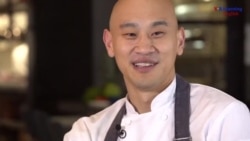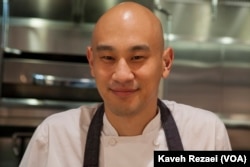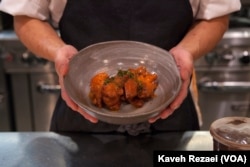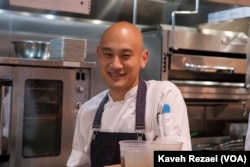Tim Ma’s parents came to the United States from Taiwan in the 1970s. They opened a restaurant. It was not a success. They found success in America, however, in computers and engineering.
In part because of their own experiences, Ma’s parents hoped he would study to become an engineer or doctor. They wanted financial security for their child.
Ma grew up in the southern U.S. state of Arkansas. He says the American South was a challenging place to live for a Chinese-American kid in the 1970s and 80s.
“There was definitely some racism there. I came up through a very non-equal, very non-Asian environment. One of the few things I remember is waking up in the middle of the night because someone had thrown a brick through me and my sister’s window. I was the kind of the dopey Asian kid and I sometimes would be not punished for that, I would be bullied for that.”
Growing up, Ma considered many professions – writer, fireman, even president. But he had a sense early on…
“I didn’t want to be an engineer.”
Ma did well in math and science classes in high school. And he ended up choosing to study electrical engineering in college.
A change of heart
Several engineering jobs later, though, Ma had a change of heart. He wanted to leave the engineering world behind and enter the restaurant business.
It was in his blood. After all, his parents had owned a Chinese restaurant in Arkansas. His uncle also owned one in New York.
Ma has a clear memory of when he decided to open his own restaurant.
“I was in Los Angeles eating in a simple sushi restaurant and sitting there with my sister and my brother-in-law and it's like ‘you know what I think I want to, like, do like Mom and Dad and Uncle Paul and I want to go and open a restaurant.’”
His parents, Ma says, could not understand why he would want to leave such a good job to open a restaurant. They had worked long hours but their own restaurant still failed.
They kept asking, “why?”
But Ma remained certain. He was going to do things differently than his parents. He was able to learn from their one major mistake as restaurant owners – they knew very little about the art of cooking.
He believes the mistake caused the restaurant to fail.
“My parents knew nothing about cooking and they knew nothing about owning a restaurant. They had this chef that was very, very good and he was making excellent food, but then the chef start(ed) to see a lot of money come in, the chef saw that and was like ‘OK, I’m going to go across the street and open a Chinese restaurant’ and it really put my parents in a bad situation.”
Back to school
So, at age 30, Ma left engineering and returned to school – cooking school. He wanted to study the fundamentals of cooking so that he could work as a chef in his own restaurant.
Ma enrolled at the International Culinary Center in New York. He received training in French cooking.
“I got to culinary school with just a little bit of savings in the middle of New York City, not knowing how to hold a knife. I didn't know anything about cooking. Never cooked through my entire life up until this point.”
Ma soon learned that he enjoyed cooking. He discovered it was similar to engineering.
“Professional cooking is consistency, efficiency, cleanliness and it's all about the process of things which you know my background in engineering was. Everything's a process everything's a theory.”
Follow his heart
In 2009, Ma opened his first restaurant in Virginia. It is called Maple Avenue. The restaurant serves American cuisine.
He set up the place with help from his wife, parents and friends. He used tables and chairs left behind from the previous owner of the restaurant space.
At Maple Avenue, Ma cooked, cleaned the ovens, fixed equipment and paid bills. He worked long hours, seven days a week.
“I don’t have a repairman, so I’m the guy. I know way too much about plumbing, equipment repair,” he says.
His long hours paid off. Ma opened his fourth restaurant last year, Kyirisan in Washington, D.C.
For Ma, Kyirisan is a special name.
It comes from his old family name, kyin, and the Chinese words for one, two, and three. The numbers represent his three children.
"And we just pushed it all together and called it Kyirisan."
He mixes his training in French cooking with his Chinese heritage to create new dishes. A popular dish is a seared scallops with coconut risotto and basil ice cream.
“We simply wanted to match basil and coconut. And we got to this point where we’re like, well, let’s just do something off the wall, and see what happens and the response was good.”
Kyirisan’s success is due to the creative menu and food, Ma says. But a lot of it just comes from “sheer hard work.”
“I think in this country you can create your own success, just by working hard. Not because you’re smarter than anybody, not because you’re more creative than anybody, just by working hard. And that's I think that’s why a lot of people end up coming to America.”
I’m Marsha James.
Marsha James wrote this story for Learning English. Caty Weaver and Ashley Thompson edited it.
We want to hear from you. Write to us in the Comments section, and visit our Facebook page.
_____________________________________________________________
Words In This Story
racism – n. poor treatment of or violence against people because of their race
come up - phrasal verb to occur in the course of time
dopey – adj. foolish or stupid
bully – v. to frighten, hurt, or threaten (a smaller or weaker person) : to act like a bully toward (someone)
change of heart – n. an important change in the way a person feels or thinks about something
culinary – adj. used in or relating to cooking
fundamental – adj. of or relating to the basic structure or function of something
consistency – n. the quality of being thick, firm, smooth, etc.
efficiency – n. the ability to do something or produce something without wasting materials, time, or energy : the quality or degree of being efficient
cuisine - n. a style of cooking
heritage - n. the traditions, achievements, beliefs that are part of the history of a person or group











